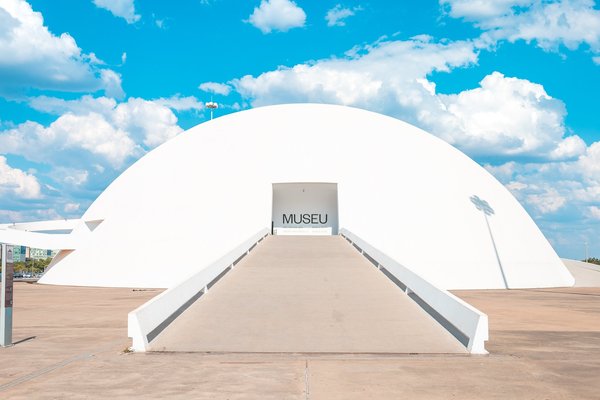Brazil
Brasilia
Brasilia is one of the major examples of the 20th century´s modern movement in architecture and urban planning.
The city officially became Brazil´s capital in April 1960. Four years before, President Juscelino Kubitschek commissioned Lucio Costa (urban planner), Oscar Niemeyer (architect) and Burle Marx (landscape architect) to build a new city from scratch. The design is known as the Plano Piloto, in which Brasilia is shaped like an airplane with residential zones and an area with government buildings.
Community Perspective: a “strange” city to some, an “awesome” one to others. As a fan of modernist architecture, Ian is an advocate of the latter opinion. Carlo has provided a 2-day itinerary.
Site Info
Official Information
- Full Name
- Brasilia (ID: 445)
- Country
- Brazil
- Status
-
Inscribed 1987
Site history
History of Brasilia
- 1987: Inscribed
- Inscribed
- Type
- Cultural
- Criteria
- i
- iv
Links
- UNESCO
- whc.unesco.org
- Official
-
- braziltravelinformation.com — Brasilia
- Related
-
- macalester.edu — Link
All Links
UNESCO.org
- whc.unesco.org — whc.unesco.org/
Official Website
- braziltravelinformation.com — Brasilia
Related Resources
- macalester.edu — Link
News Article
- Jan. 9, 2023 reuters.com — Bolsonaro backers ransack Brazil presidential palace, Congress, Supreme Court
- Feb. 7, 2018 usnews.com — Roadway Overpass Collapses in Brazilian Capital
- May 9, 2014 iol.co.za — Brazil's retro capital hits middle age
- Dec. 6, 2012 bbc.co.uk — Oscar Niemeyer, Brasilia's architect, dies at 104
- Jan. 31, 2009 google.com — Preservationists say they are fighting to protect Brasilia's signature skyline designed by legendary architect Oscar Niemeyer - from Oscar Niemeyer himself.
Community Information
- Community Category
- Human activity: Urban planning
Travel Information
Recent Connections
-
Cities commanded "Ex nihilo"
1960 Government / Kubitschek The remote…
-
Over 100,000 inhabitants
304,000 (2012)
-
Location for a classic movie
That Man from Rio (with JP Belmondo) (1…
Connections of Brasilia
- Geography
-
-
Located in a Capital City
Brasilia (Capital of Brazil)
-
- Trivia
-
-
Over 100,000 inhabitants
304,000 (2012)
-
Hosted a FIFA World Cup match
The rather beautiful Estádio Nacional Mané Garrincha hosted seven matches in the 2014 World Cup, and is now apparently mostly used as a bus park. -
Google Doodles
21 April 2012, Brasilia's AnniversarySee www.google.com
-
Registered when architect was alive
Principal architect of Brasilia was Oscar Niemeyer (1907 - 2012)See en.wikipedia.org
-
- History
-
-
Cities commanded "Ex nihilo"
1960 Government / Kubitschek The remote, unpopulated "Cerrado" (savannah) of the central highlands. To force the development of the interior and symbolize a modern, democratic future.
-
- Architecture
-
-
Designed by Oscar Niemeyer
Designed a large number of residential, commercial and government buildings in the new capital -
Modern Urban Planning
Brasilia, a capital created ex nihilo in the centre of the country in 1956, was a landmark in the history of town planning. -
International style
-
Architectural design competitions
Lucio Costa and Oscar Niemeyer won a competition to design the new city in 1956 -
Ideal City
-
Hyperboloid Structure
Cathedral of Brasilia (Niemeyer) -
Reinforced Concrete
Quote from "History of Reinforced concrete": "Oscar Niemeyer (Brasil) built new capital of the country ? Brasilia ? from reinforced concrete."
-
- World Heritage Process
-
-
Perfect Inscriptions
1987 -
Controversial at inscription
It was a city that was barely 30 yrs old when it was inscribed on the list, and several representatives, notably the american delegate, opposed its inscription, " examination of 20th century cities should come after all the traditional historic towns have been examined"
-
- Religion and Belief
-
-
Cathedrals
Metro' Nossa Sen'a Aparecida, Cat Militar Sta Maria dos Militares
-
- Human Activity
-
-
Geoglyphs
It is often stated that the outline plan for Brasilia was designed by Lucio Costa in the form of an airplane or even a dragonfly. This seems likely to have been a post hoc rationalisation (as in "Forming the cockpit of the Brasilia airplane plan is the Plaza of Three Powers"). Costa merely stated in his "Pilot Plan" of 1957 "Basically, it was born of the primary gesture of one who marks or takes possession of a place: two axes crossing at right-angles; the very sign of the Cross.It was then sought to adapt this sign to the local topography, the natural drainage of the area, to the best possible orientation; one of the axes was curved in order to make it fit into the equilateral triangle which limits the urbanized area -
Changing of the Guard ceremonies
Palacio do Planalto. “There is a ceremonial changing of the guard outside the gates every hour on weekends and every two hours during the week.” (LP)See www.youtube.com
-
- Constructions
-
-
Dovecotes
Modern dovecote designed by Oscar Niemeyer is located on the Praça dos Três Poderes in BrasiliaSee en.wikipedia.org
-
Sites of Parliament
Brasilia National Congress Building designed by Niemeyer. Houses the Senate and the Chamber of Deputies -
Eternal Flames
Outside the Pantheon of Fatherland and Freedom, Tancredo Neves, Brasília, on top of a tower built on the diagonal, burns an eternal flame which represents the freedom of the people and the country's independence. (wiki)See en.wikipedia.org
-
- WHS on Other Lists
-
-
Memory of the World
Architectural Archive of Oscar Niemeyer -
Pritzker Architecture Prize
Oscar Niemeyer (1988) -
Creative Cities
DesignSee www.unesco.org
-
- Timeline
-
-
Built in the 20th century
Inaugurated in 1960.
-
- Science and Technology
-
-
Mathematical Concepts
Cathedral of Brasilia - Hyperboloid of revolution. Hyperbolic of revolution are surfaces generated by rotating a hyperbola around an axis. The shape of the roof of the cathedral is hyperboloid of revolution with asymmetric sections and consists of 16 identical columns.See en.wikipedia.org
-
- Visiting conditions
-
-
Best seen from the sky
"often compared to the shape of a bird in flight"
-
- Literature & Film
-
-
Location for a classic movie
That Man from Rio (with JP Belmondo) (1964), where Brasilia during its construction can be seen.
-
News
- reuters.com 01/09/2023
- Bolsonaro backers ransack Brazil p…
- usnews.com 02/07/2018
- Roadway Overpass Collapses in Braz…
- iol.co.za 05/09/2014
- Brazil's retro capital hits middle…
Recent Visitors
Visitors of Brasilia
- Adrian Turtschi
- Alberto Rodriguez Gutierrez
- Alejandro Lau
- Alexander Lehmann
- Alex Marcean
- Alvaro1404
- Ammon Watkins
- Aspasia
- Atila Ege
- Bill Maurmann
- Carlo Sarion
- Carlos Sotelo
- Cirene Moraes
- Colossus
- Csaba Nováczky
- CynthiaSam
- Daniel Gabi
- dave wood
- Deffra
- Dorejd
- Doubanjiang
- edstar500
- Els Slots
- Eva Kisgyorgy
- Fan Yibo
- GabLabCebu
- Gilles
- giloudepuertorico
- Hammeel
- Harry Mitsidis
- headventure
- Iain Jackson
- Ian Cade
- janis
- Jan Zimmermann
- Jarek Pokrzywnicki
- JL
- João Aender
- Joel on the Road
- Jon Opol
- Kevin247
- Kevin Padley-Knight
- kiank37
- Kjlauer
- Kurt Lauer
- Loic Pedras
- Luis Filipe Gaspar
- Lukasz Palczewski
- Maciej Gil
- Michael Ayers
- Michael Novins
- MMM
- Nihal Ege
- Palimpsesto
- Patrik
- Pchxiao
- Peter Lööv
- Pieter Dijkshoorn
- Rafabram
- Ralf Regele
- Reza
- Roger Ourset
- Roman Bruehwiler
- RYU
- S. Anril Tiatco
- Sclowitz
- Shandos Cleaver
- Solivagant
- Stanislaw Warwas
- Thomas Buechler
- Thomas van der Walt
- Vanessa Buechler
- Walter
- Wojciech Fedoruk
- Xiquinho Silva
- Zoë Sheng
Community Reviews
Show full reviews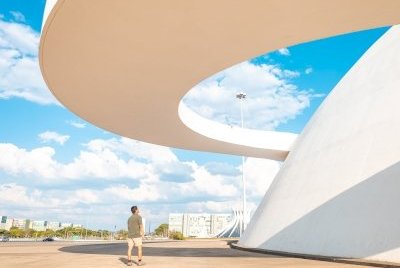
I have always associated modernist architecture with minimalism and utility, but also with grittiness and to some extent, urban decay. It did not help that modernist architecture originated brutalism, which is another architectural style that I did not appreciate until recently. Visiting Brasilia has changed all of that—this is the place where I finally got to understand and even admire this architectural movement. The previous reviews pretty much said everything about the history, OUV, and logistics of visiting Brasilia, but I thought I'd add another review by sharing my experience visiting the city at the end of September 2022.
I flew from Belo Horizonte to Brasilia and from above, you could really appreciate the distinct shape of the city. Most of the government and cultural buildings of interest are built along Eixo Monumental (the main axis), while residential buildings are located in the wings. The areas adjacent to the axis on both sides are organized into sectors, which are named after the type of establishments they contain (e.g., Setor Comercial, Setor Bancario, and Setor Embaixadas). The city is bounded by Lago Paranoá and Parque Nacional de Brasilia to the east and northwest, respectively. Additionally, the international airport is situated in the south wing.
The first day was spent roaming around:
- Museu Nacional da República – shaped like a spaceship or the planet Saturn cut in half. Exhibits local contemporary and edgy art.
- Catedral Metropolitana – arguably the most iconic modern religious structure in Brazil just …
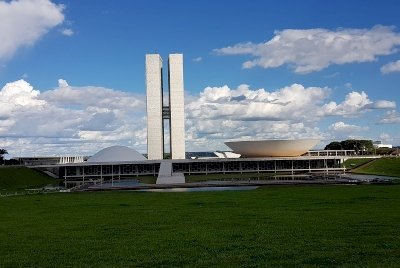
A lot has been written on this site about Brasilia so it is difficult to add something extra. In short, we just loved our short visit there. Brasilia is perhaps the world's largest example of urban planning - four years before it was built, there was nothing but an idea.
Perhaps no country was better suited to such a task than Brazil. First, the disproportions in the development of the coast and the interior of the country were huge then. Secondly, the most outstanding architects with the vision, knowledge and experience needed to implement such an ambitious project came from Brazil. It also seems that the country has had a climate that allows for the implementation of such bold, utopian assumptions.
I imagine the delight of Lucia Costa, Oscar Niemeyer, Roberto Burle Marx and others - few architects in history have had such a great field to show off, being able to let their imagination run wild in an almost unlimited way.
The gentlemen did not stop at copying the solutions known earlier and created the city not even for their times, but for times that were yet to come (some people claim that they still had not come). The city was built on the plan of a flying condor or a plane, with residential districts located along the wings, and public buildings in the body. At the top of this corps - the head of a condor or the nose of the plane - there is …
Keep reading 0 comments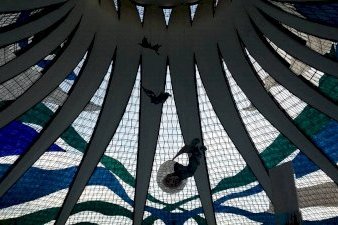
WHS#23
Brasilia was my entry point into South America when I visited back in April 2016, and it remains one of the most unique cities I've ever visited. My family and I took a taxi tour around for a few hours, and it only took a few hours to be sold. The Cathedral, Dom Bosco Sanctuary, Praca dos Tres Poderes, and the Juscelino Kubitschek Bridge were probably the greatest highlights, but the city as a whole is a masterpiece in modern architecture and urban planning. I don't think any other city in the world was composed so meticulously, specifically, and distinctly. And while some say that Brasilia is a failure in urban planning, I beg to differ. Even though the entire city is uniformly modern, I wasn't ever bored walking around, although that may partially be because of my excitement to be in South America for the first time. Sure, it's a pretty spread-out city, but walks here felt even more pleasant and safe than walking in Rio de Janeiro did. It's not totally ideal for all citizens, but I heard nothing negative about it from its inhabitants. They definitely have reason to be proud of their city. All of this isn't to say that Brasilia is without flaws. The fact that we saw almost all of the city's highlights within a few hours does show that this is no historical city that I could explore for days. Though the variety of different buildings is great, from the sculpture-like …
Keep reading 0 comments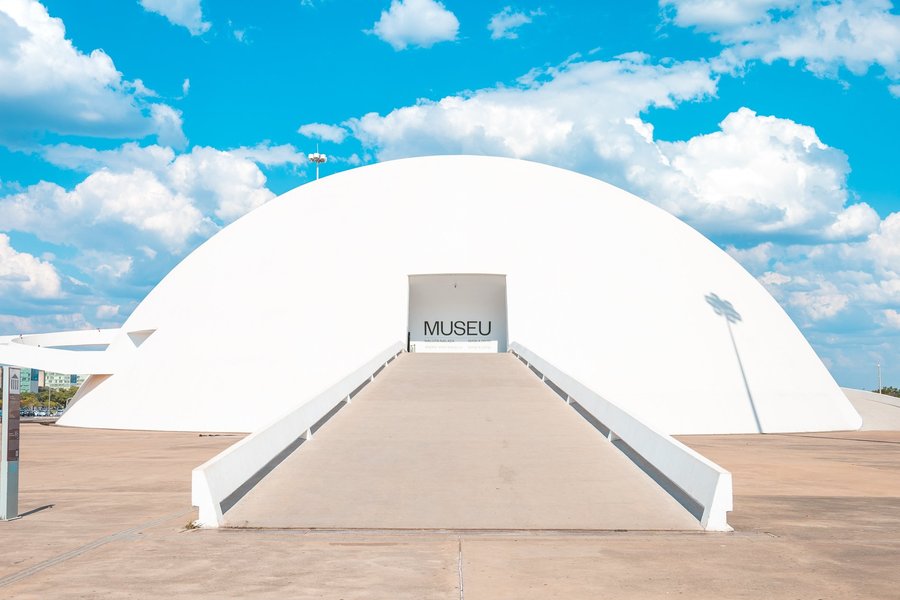
I'm with Ian - Brasilia fascinates me! I loved the brazen confidence that that Niemeyer showed in his design for Brazil's new capital in the 1960's. I love the pomp and circumstance that you can nearly always find in the Eixo Monumental area. I especially love sitting in the Catedral Metropolitana and just staring at the glass. In my opinion, Brasilia can be well accomplished in a long day with a lot of walking. The Praça dos Trés Poderes is the center park-like area with the key buildings surrounding the long plaza.
If you just want to hit the most important spots, take a taxi (15 minutes without traffic), Uber or bus from the airport to the Biblioteca Nacional. From there, you can walk along the south past the Museu Nacional, Cathedral Metropolitana and on down the hill to the Congresso Nacional building and then the various palacios and monuments. At the giant flag, turn and head back up the hill to the Teatro Nacional. At a minimum, try to visit the Cathedral, Congresso and the Panteão de Patria e da Liberdade Tancredo Neves with the eternal flame and amazing view back up toward the Biblioteca.
The Praça is especially beautiful at night when the buildings are all lit up.
You can join a walking tour or just get a map from your hotel or visitors center and walk the area on your own. If you have time, don't miss the Santuario Dom Bosco - about 1km …
Keep reading 0 comments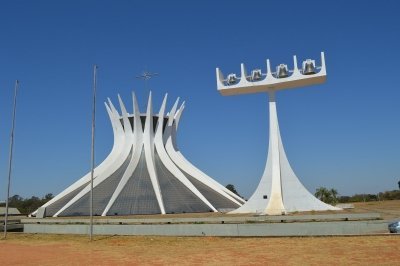
In August 2018, I visited Brasília. The city is particularly inhospitable to pedestrians, so I engaged a local guide with a car, Juan Luis Hermida, one of the very best I have ever encountered. Atheist Oscar Niemeyer achieved the apotheosis of his nearly eight-decade architectural career with the Cathedral of Brasília, which was completed in 1970, a dozen years after its cornerstone was laid in 1958. In 1990, the cathedral’s outer roof was lined with stained glass, now filling the ineffable place of worship with color and light, where the nave is overlooked by three angelic statues. The city was created on a grand scale, more for automobiles than pedestrians, so the streets and plazas were generally devoid of people, except for a few protesters in front of the Palace of the Supreme Court calling for the release of Lula, the former president, from prison so he can run in the election scheduled for October 2018.
Keep reading 0 comments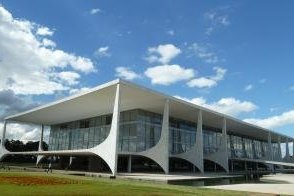
Some people will hate Brasilia, but I am unapologetically going to state I thought it was awesome. Brasilia contains some of the finest buildings I have ever visited, and in the Planalto Palace (for exterior) and the Itamaraty Palace (for interior) perhaps the two most beautiful I have ever seen. I was originally going to qualify that by saying "most beautiful modernist building" but I really can't think of any other buildings I have thought to be more perfect. The clear simple elegance of the forms is then enhanced by playful, almost baroque flourishes such as the flared columns or exquisite spiral staircase.
As a fan of modernist architecture and especially of Oscar Niemeyer's work I am predisposed to liking this site, throw in that it was my first South American WHS, my personal site visit 250, and that I have a couple of politics degrees to give context to the buildings, then things were very much stacked in favour of a tour around the Brazilian capital. However even my high expectations were surpassed, the fact that the majority of them were open and welcoming on free guided tours really added to our enjoyment.
Now I fully appreciate not everyone will share my enthusiasm for the work of Oscar Niemeyer, nor be as able to gloss over some of Brasilia’s failings. However the sheer quantity of world class structures in one city will hopefully entertain even those not fully enthralled by minimalist repetition.
The one thing that came as a …
Keep reading 0 comments
Where else in the world you have the executive, legislative and judiciary powers holding office on the same square? It's all happening on the Praca dos tres Poderes in the Brazilian capital. A few meters away is the Itamarati, a marvellous modern building that houses the Ministry of Foreign Affairs.The purpose-built federal capital of Brazil succeeded Rio de Janeiro in 1960, and was laid out by Professor Lucio Costa in the shape of an airplane, with many buildings designed by Brazil's most famous architect, Oscar Niemeyer. All planned, all organized.For instance on Esplanada dos Ministerios, you can find 19 tall ministry buildings where people go to work. The appartment buildings where they live were planned just next door. But the most impressive sites for me were 2 churches: The Sanctuary of Dom Bosco with its multi blue stained glass windows ranging from shades in light blue, to indigo, to marine blue and depending on the day light, it can be an extraordinary atmosphere inside this church; the other one is the Cathedral Metropolitana, a hyperboloid structure,constructed from 16 concrete colums, weighting 90 tons each.Inside you can see 3 aluminium angels suspended from the ceiling; the altar was donated by Pope Paul VI.The capital has been declared a World Heritage site in 1987. Brasilia has very little fancy restaurants, if you imagine that all the embassies are located here. Bar Beirute is a funny place. Middle East cuisine with Brazilian entertainment, its a GLS location and the beer is icecold! On …
Keep reading 0 comments
Before I visited Brasilia,
I knew next to nothing about it.
I just knew it was the new capital of Brazil
Built somewhere in the middle of the country.
That its plan and architecture was eclectic...
But no more than that.
I had never heard of Juscelino Kubitschek,
The "bossa nova" president
Under whose tutelage the city was established;
Nor of Lucio Costa, the brilliant city planner,
Nor of the heroic artists, nor of the tireless workers.
Yes, Oscar Niemeyer I'd heard mentioned
But I had no knowledge really of what greatness
He's accomplished; not even that he's Brazilian!
...I accepted an invitation suddenly from out of the blue,
An invitation to visit Brasilia.
And now I know about Brasilia,
Not nearly enough but enough to know
That it's a place where you feel alive! Impassioned!
By its innovative ways, its buildings of epic grandeur;
By the ebullient energy and humanistic spirit
Of the beautiful brasilienses: gracious, delightful, spontaneous!
The sky is sapphire blue in Brasilia, the earth carnelian red;
Bold buildings soar in the brightest of whites!
Not shy pastels, but primary colors, making a statement!
The shapes, the curves, the four-leaf clover roads, the bridges of fantasy,
The pyramidal, the concave and convex, the rounded U.F.O.-like buildings,
The Cathedral like hands in prayer holding the miracle within.
I know about Brasilia now.
I know where it gleams like a dream of a mythical city.
I can tell you how to get there.
You'll be glad you came.
Keep reading 0 comments
Brasilia is strange place. A planned city, created from nothing when the Brazilian government decided to move the capital inland, in an attempt to develop the interior of the country, Brasilia is in the shape of an airplane and most buildings downtown are built in a modernist style (read white and somewhat spartan looking). That said, some of the architecture and planning schemes are fascinating and after spending several days in Rio beforehand, Brasilia is like an oasis of calm. The extreme planning of the city, however, prevents it from feeling particularly "lived in" and the great distances between buildings (again based on modernist conception of cities) makes it difficult to get around quickly.
Keep reading 0 comments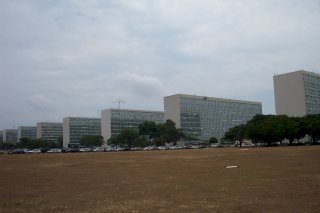
This is a strange city, that cannot be compared to any other in Brazil (or the rest of the world). To be honest: the first thing that came to my mind was that they dropped an atomic bomb here. It must have happened in the early 1970s, in a Bucharest-like city. The people are slowly starting to return now, occasionally you see one or two moving about the fields.
To see some of the architecture, I joined a 3-hour bus tour. We visited 9 places of interest. The most impressive I found was the Sanctuario Dom Bosco. When you step inside this church, you´re surrounded by a blue light shining through the many glass-tiled windows.
The other buildings are a lot soberer. Some are beautiful in their simplicity (like the Church of Our Lady of Fatima), others are quite depressing (like the highrise buildings that were built for the ministries).
Keep reading 0 comments
